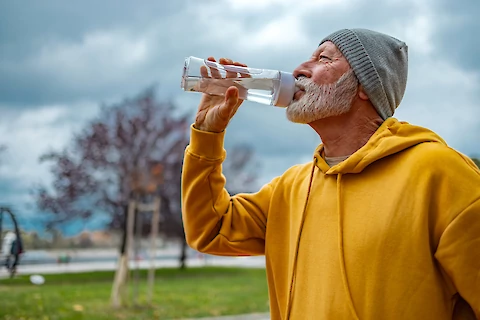
With chilly temperatures and less perspiration, it's easy to overlook the importance of winter hydration for seniors. This risk can be particularly high for our elderly loved ones, who are naturally more prone to dehydration due to physiological changes that come with age. Winter wellness for seniors goes beyond bundling up in warm clothes, and we're here to explore that.
Understanding Dehydration in Seniors
Seniors are more susceptible to dehydration for a few reasons. Age-related physiological changes can decrease their sense of thirst, and certain medications may cause fluid loss. Moreover, fear of incontinence can also lead some seniors to deliberately limit fluid intake.
Unfortunately, dehydration can escalate quickly in seniors, leading to complications such as urinary tract infections, dizziness, confusion, and even hospitalization.
The Impact of Winter Weather on Seniors' Hydration
As the mercury drops, so can the hydration levels in our bodies, especially for seniors. Colder temperatures can suppress thirst even further, and the presence of heating systems can lead to increased water loss through the skin. Contrary to popular belief, we don't perspire less in winter—we just notice it less because the sweat evaporates more quickly in the cold, dry air. Therefore, hydration is just as crucial in winter as it is during the heat of summer.
Recognizing Signs of Dehydration in Seniors
Early detection is vital in preventing severe dehydration. Common signs include a dry mouth, decreased urination, rapid heartbeat, low blood pressure, and lethargy. Cognitive symptoms, such as confusion or irritability, may also indicate dehydration. In later stages, individuals may experience sunken eyes, decreased skin elasticity, and even fainting.
Best Types of Fluids for Seniors
While water is the obvious choice for hydration, it's not the only option seniors have. Some seniors may not enjoy the taste of water, making it challenging to maintain adequate fluid intake. Incorporating other types of liquids can make the task easier. Herbal teas, clear broths, and natural fruit juices can be beneficial. Foods with high water content, like watermelon, cucumbers, oranges, and strawberries, can also support hydration. However, it's essential to avoid beverages with high sugar or caffeine content that can lead to increased urination and fluid loss.
Practical Tips and Strategies for Ensuring Adequate Hydration for Seniors
Creating a daily routine that incorporates fluid intake throughout the day can help ensure seniors are getting enough liquids. Encourage them to have a glass of water with medication or a cup of tea with a snack. Offering fluids in easy-to-use containers can also help by reducing obstacles. Using a chart or an app to track fluid intake could be useful for some seniors and can be a good way to involve them in managing their health.
Senior Helpers Grapevine Lake Provides Outstanding Care for Seniors
Ensuring seniors stay hydrated during the cold winter months is a priority that requires attention and intention. With the practical tips provided, we hope that you're better equipped to help your senior loved ones maintain optimum hydration, promoting their overall health and well-being.
If you need more assistance in caring for your senior relatives, particularly in Flower Mound, Dallas, Bedford, Colleyville, or Euless, don't hesitate to reach out to us at Senior Helpers Grapevine Lake.